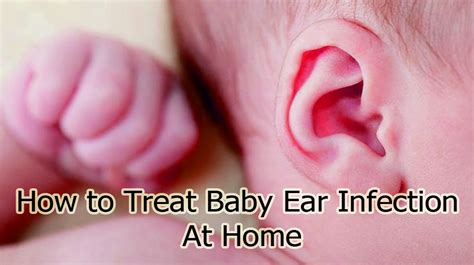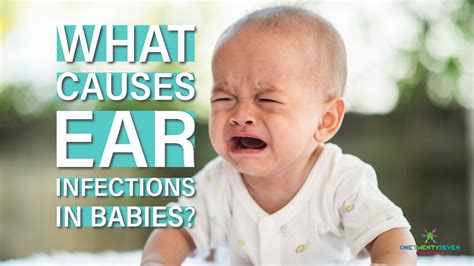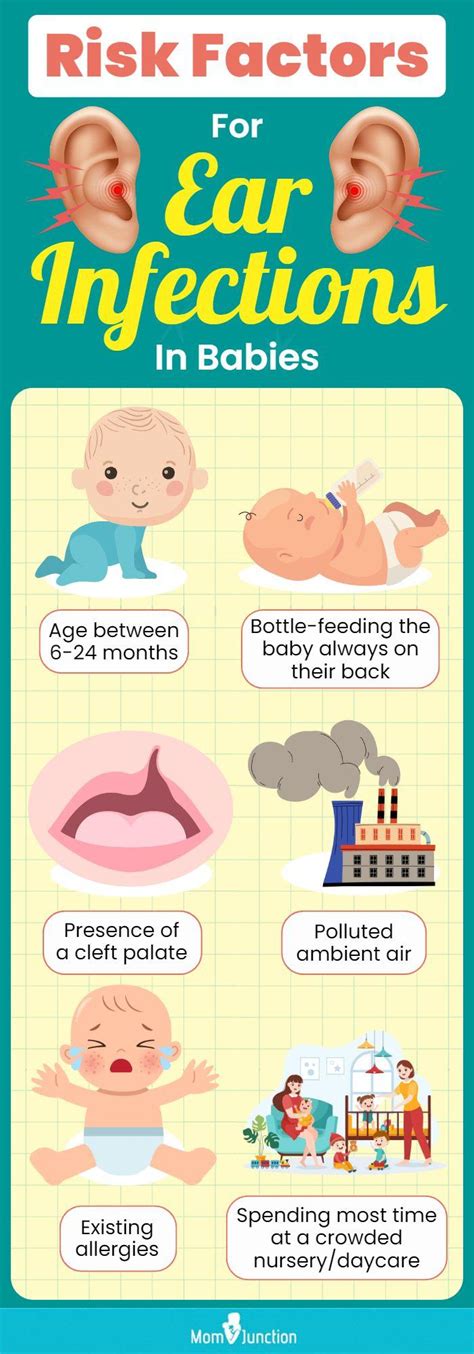Intro
Identify baby ear infection symptoms, including fever, ear pulling, and fussiness. Learn signs, causes, and treatments for infant ear infections, otitis media, and middle ear infections to ensure prompt medical attention.
Baby ear infections are a common health issue that affects many infants and young children. Ear infections occur when bacteria or viruses infect the middle ear, causing inflammation and fluid buildup. This can be a painful and uncomfortable experience for babies, and it's essential for parents to recognize the symptoms to seek medical attention promptly.
Ear infections can be caused by a variety of factors, including colds, flu, and allergies, which can lead to the accumulation of fluid in the middle ear. When this fluid becomes infected, it can cause a range of symptoms that can be distressing for babies. Some of the common causes of ear infections in babies include exposure to cigarette smoke, not being breastfed, and having a family history of ear infections.
It's crucial for parents to be aware of the symptoms of ear infections in babies, as early detection and treatment can help prevent complications and promote a speedy recovery. Some of the common symptoms of ear infections in babies include pulling or tugging at the ears, crying or irritability, and difficulty sleeping. Babies may also experience a loss of appetite, fever, and vomiting, which can be distressing for parents.
Baby Ear Infection Symptoms

Ear infections can be classified into different types, including acute otitis media (AOM) and otitis media with effusion (OME). AOM is a bacterial or viral infection that causes inflammation and fluid buildup in the middle ear, while OME is a condition where fluid accumulates in the middle ear without any signs of infection. Both types of ear infections can cause a range of symptoms, including ear pain, fever, and difficulty hearing.
Types of Ear Infections
Ear infections can be further classified into different types, including: * Acute otitis media (AOM) * Otitis media with effusion (OME) * Chronic otitis media * Recurrent otitis media Each type of ear infection has distinct symptoms and treatment options, and it's essential for parents to consult with a healthcare professional for an accurate diagnosis and treatment plan.Causes of Ear Infections in Babies

Ear infections in babies can be caused by a variety of factors, including:
- Colds and flu
- Allergies
- Exposure to cigarette smoke
- Not being breastfed
- Family history of ear infections These factors can increase the risk of ear infections in babies, and it's essential for parents to take preventive measures to reduce the risk of infection.
Risk Factors for Ear Infections
Some babies are more susceptible to ear infections due to certain risk factors, including: * Age: Babies under the age of 2 are more likely to develop ear infections * Family history: Babies with a family history of ear infections are more likely to develop the condition * Exposure to cigarette smoke: Babies exposed to cigarette smoke are more likely to develop ear infections * Not being breastfed: Babies who are not breastfed are more likely to develop ear infections * Allergies: Babies with allergies are more likely to develop ear infectionsTreatment Options for Ear Infections

Treatment options for ear infections in babies depend on the severity and type of infection. Some common treatment options include:
- Antibiotics: For bacterial ear infections
- Pain relief medication: To manage ear pain and fever
- Ear drops: To help relieve ear pain and reduce inflammation
- Surgery: In severe cases of ear infection, surgery may be necessary to drain the fluid and relieve pressure.
Home Remedies for Ear Infections
Some home remedies can help alleviate the symptoms of ear infections in babies, including: * Warm compresses: Applying a warm compress to the affected ear can help relieve pain and reduce inflammation * Elevating the head: Elevating the head of the baby's bed can help reduce congestion and promote drainage * Breast milk: Breast milk has antibacterial properties that can help fight infection and promote healing * Rest and hydration: Ensuring the baby gets plenty of rest and stays hydrated can help the body fight off the infectionPrevention of Ear Infections in Babies

Preventing ear infections in babies requires a combination of good hygiene practices, a healthy lifestyle, and regular check-ups with a healthcare professional. Some ways to prevent ear infections in babies include:
- Practicing good hygiene: Washing hands regularly, especially after changing diapers or before feeding
- Avoiding exposure to cigarette smoke: Keeping the home and car smoke-free can help reduce the risk of ear infections
- Breastfeeding: Breast milk has antibacterial properties that can help fight infection and promote healing
- Getting regular check-ups: Regular check-ups with a healthcare professional can help identify any potential issues early on
Importance of Early Detection and Treatment
Early detection and treatment of ear infections in babies are crucial to prevent complications and promote a speedy recovery. Some of the complications of untreated ear infections include: * Hearing loss: Untreated ear infections can lead to permanent hearing loss * Speech delays: Ear infections can affect speech development in babies * Learning difficulties: Untreated ear infections can lead to learning difficulties and behavioral problems * Increased risk of future infections: Untreated ear infections can increase the risk of future infectionsConclusion and Next Steps

In conclusion, baby ear infections are a common health issue that requires prompt attention and treatment. By recognizing the symptoms, understanding the causes and risk factors, and seeking medical attention early, parents can help prevent complications and promote a speedy recovery. It's essential for parents to work closely with healthcare professionals to develop a treatment plan that meets the unique needs of their baby.
What are the common symptoms of ear infections in babies?
+Common symptoms of ear infections in babies include pulling or tugging at the ears, crying or irritability, difficulty sleeping, loss of appetite, fever, and vomiting.
How can I prevent ear infections in my baby?
+Preventing ear infections in babies requires a combination of good hygiene practices, a healthy lifestyle, and regular check-ups with a healthcare professional. Some ways to prevent ear infections in babies include practicing good hygiene, avoiding exposure to cigarette smoke, breastfeeding, and getting regular check-ups.
What are the complications of untreated ear infections in babies?
+Untreated ear infections in babies can lead to complications such as hearing loss, speech delays, learning difficulties, and an increased risk of future infections.
How can I treat my baby's ear infection at home?
+Some home remedies can help alleviate the symptoms of ear infections in babies, including warm compresses, elevating the head, breast milk, and rest and hydration. However, it's essential to consult with a healthcare professional for an accurate diagnosis and treatment plan.
When should I seek medical attention for my baby's ear infection?
+Parents should seek medical attention immediately if their baby shows signs of an ear infection, such as severe ear pain, fever, or difficulty hearing. It's also essential to consult with a healthcare professional if the baby's symptoms worsen or do not improve with treatment.
We hope this article has provided you with valuable information about baby ear infections. If you have any further questions or concerns, please don't hesitate to comment below or share this article with others who may find it helpful. Remember, early detection and treatment are crucial to preventing complications and promoting a speedy recovery. By working together with healthcare professionals and taking proactive steps to prevent ear infections, parents can help their babies stay healthy and thrive.
